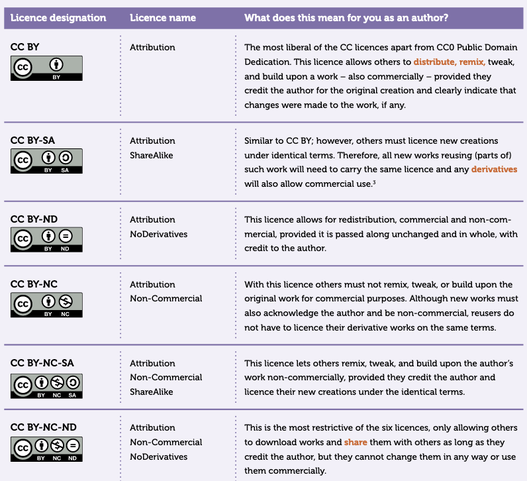Reuse licences
Open licences are key to enabling wide reuse of publications available in Open Access (OA).

Open content means anyone can freely access, use, modify, and share for any purpose (subject, at most, to requirements that preserve provenance and openness). (opendefinition.org)
Why are licences important?
Copyright protection
Scholarly publications are typically protected by copyright. Others can only use them in ways permitted by copyright law.
All other uses (e.g. copy, distribute, modify, search, link, crawl, mine...) require explicit permission from the copyright holder(s) - except for some specific and limited uses provided by exemptions in copyright law.
Grant upfront permission for reuse
Copyright holders can use licences to grant certain permissions to reuse their protected work and to communicate upfront about what kinds of reuse are permitted by third parties.
An open licence imposes no or very few restrictions or conditions for reuse.
Without a licence, OA publications can only be read and cited by third parties.
Creative Commons licences
This set of 6 standard licences is most commonly used for scholarly works published in OA. CC licences allow others to share and reuse copyrighted materials under specified conditions, ranging from very permissive to more restrictive.
Four conditions can be included in a CC licence
- Attribution (BY): the original author needs to be credited.
- Share Alike (SA): adaptations of the work have to be shared under the same terms.
- Non-Commercial (NC): use of the work for commercial purposes is not allowed.
- No Derivatives (ND): the work can only be used in unadapted form (no remixing, adapting etc.)
The different CC licences use different combinations of these conditions. Note that all CC licences require attribution.

CC0 Public Domain Dedication
Granting one of the six CC licences does not imply a transfer of copyright.
It is also possible to dedicate a copyrighted work to the public domain by using the CC0 public dedication tool. This means that:
- Copyright and related rights are waived (to the extent that they can be waived).
- Others can distribute, remix, adapt, and build upon the work without any conditions.
Open licences
Not all CC licences are considered truly 'open', in the sense of allowing reuse with no or very few conditions.
Only the following are conformant with the Open Definition:
- CC0 Public Domain Dedication
- CC BY
- CC BY-SA
Choosing a licence
When publishing directly in OA
You will usually have to make your OA publication available under a specific licence.
-
Publishers might give you a more limited list of CC licences to choose from (e.g. CC BY and CC BY-NC-ND).
-
Some publishers use non-standard, publisher-specific licences instead of CC-licences.
-
Your funder might require you to select a specific licence, such as CC BY.
-
If you are free to apply a CC licence, think about how you want your work to be reused (or not).
-
Keep in mind that CC licences and CC0 cannot be revoked later on.
Need help? Use the licence chooser
When using the 'green' (i.e. repository) route to OA
You might not be able to choose a(ny) CC licence or CC0 for your publication.
- To grant a licence you must be (or have permission from) the copyright holder, or at least have retained sufficient rights in your work.
- Belgian OA legislation gives you the right, for scientific journal articles, to make the Author's Accepted Manuscript (AAM) version publicly available via a repository after embargo, but not necessarily under a licence of your own choosing.
- Without sufficient rights, check your publishing agreement and/or the publisher's policy (e.g. via SherpaRomeo) to see what (if any) licence is allowed for self-archived content.
- If no licence can be applied, permitted reuse of full texts made publicly available via Biblio is limited to what is allowed by Belgian copyright law.